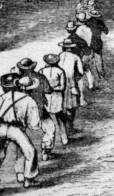Moving to the Head of the Line

My dad had two fears: the nursing home and a long-winded speaker at his funeral. He avoided the first; the jury still debates the second.
The call from his apartment building came unexpectedly on Thursday morning. “Your dad has passed out and has no blood pressure.” But when I got there minutes later, he had revived. Flat on his back in the floor, he joked with the paramedics hovering over him.
For a 93-year-old, he did well in the hospital, and we had expected to take him home after a brief stay. But all his systems shut down suddenly on Friday evening, “old and worn out” as he often told us.
Looking back, I realize that he had frequently exhibited a peculiar sense of timing at critical points of life, this one being no exception. Four years ago, for example, he decided that he needed to give up a house for a retirement apartment. Afterwards, his health improved enough to extricate himself from all his medications.
Then just a month later he concluded that he needed to quit driving. In picking up the truck keys as he had asked, I was also removing his last grip on independence. But it was time.
He called me the Sunday before his death, worrying that the arrangements for his funeral wouldn’t be handled properly. I assured him otherwise but promised that my sister, Sara, and I would get all loose ends tied up that week. That satisfied him.
Then came the hospital trip on Thursday.
Perfectly alert but seemingly a bit tired, he began asking “Where’s Sara?” around noon on Friday. Each time—there were probably a dozen—I explained that she was on her way. When he acknowledged her arrival, I went home to rest. Within a couple of hours, though, he was gone.
We sat with him in the hospital room for two hours awaiting the arrival of the funeral director. We reminisced and laid plans: I would be the dreaded long-winded speaker.
Beyond that, I wrestled with a peculiar revelation. From my birth 60 years before until that moment, there had always been someone older in my line of ancestry. But the years had gradually, relentlessly taken all except my dad. And in the instant of his death, I moved to the head of the line.
While he was at the head of the line, Daddy frequently apologized for living so long and for being so much trouble. At such times I assured him, “It’s no trouble. You’re doing the very best that you can.” “Thanks for saying that,” he’d invariably reply.
Don’t those at the head of the line want to be loved and accepted, valued and honored by those lined up behind them? Don’t they want their contributions and sacrifices acknowledged and appreciated? Indeed. I see that more clearly today from my new vantage point.
Though he never spoke to us about World War II for a full 55 years, “The War” was on his mind constantly for the last five. As he lay on his bed, the people, places, difficulties, and distresses of that great struggle marched through his mind with greater intensity than today’s news. He recently confessed, “The War just won’t turn me loose.”
The War finally released him on December 9, 2005. But I wonder this: what will have hold of me until I eventually relinquish my unenviable place at the head of the line? A worthy cause, I pray.
Not that I have already obtained, or am already made perfect: but I press on, if so be that I may lay hold on that for which also I was laid hold on by Christ Jesus. (Philippians 3:12)
Moved up one step today;
My turn’s not far away.
On to the front I surely go.
Once far — but now so near —
I see the head from here,
Brought closer with each death, I know.

